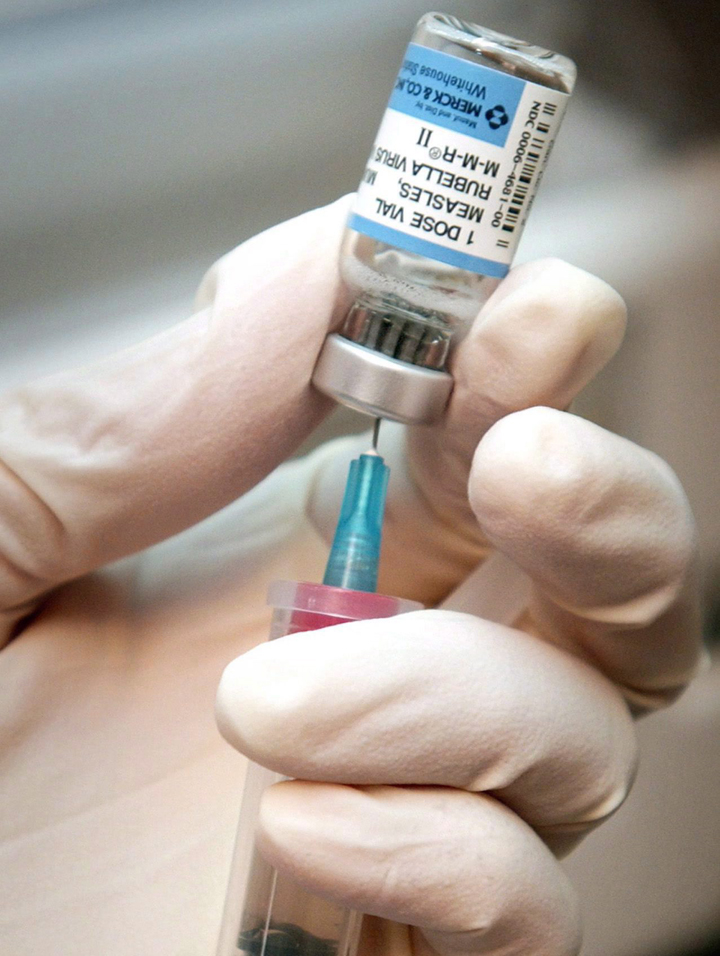TORONTO — A University of Toronto investigation into a course that taught anti-vaccination materials concluded the instructor’s approach did not warrant concern and the course was not “unbalanced.”

And the author of the report, a former president and CEO of Public Health Ontario, said he would have come to a different conclusion if his investigation had convinced him students in the course were being instructed to embrace the views of the anti-vaccination movement.
“If I had any sense that is what the outcome had been I would have expressed concern,” Dr. Vivek Goel, the university’s vice president for research and innovation, told The Canadian Press in an interview.
“As a public health physician I am firmly convinced of the benefits of immunization. As an academic, I am committed to ensuring that students learn in an environment that prepares them to think critically and evaluate controversial issues in an appropriate way.”
READ MORE: Survey finds shifting views on vaccines after outbreaks of preventable diseases
Goel’s three-page report is dated March 17, but it was only released publicly on Monday.
It looked into a course entitled Alternative Health: Practice and Theory, taught in the health studies program of the department of anthropology at the university’s Scarborough campus. It was an elective class for fourth-year students.
It was taught by homeopath Beth Landau-Halpern, who was featured in a CBC Marketplace investigation where she promoted nosodes – so-called homeopathic vaccines – to a young mother.
- Ontario NDP MPP resigns to run for federal Liberals in upcoming byelection
- Frank Stronach trial delayed as defence asks for more time to review new evidence
- Toys “R” Us Canada facing another lawsuit from landlord claiming it’s owed rent
- GO Transit to run ‘modified schedule’ after Toronto train derailment: CEO
Although nosodes are licensed for use in Canada – a fact which confounds advocates of science-based medicine – they are not vaccines and cannot be prescribed to prevent disease.

Get weekly health news
Landau-Halpern did not respond to requests for an interview. Goel would not comment on her, other than to say the way she is being characterized in social media “doesn’t really reflect reality.”
The university asked Goel to look into the course after some of its professors and a number of external experts complained about it.
READ MORE: HPV vaccine program expanded to at-risk boys and young men
“Students taking (the course) … are in their final year of study and are expected to approach controversial topics with a critical lens,” he wrote, adding there were no complaints from students about the course.
Goel noted, though, that the course would have been stronger had it relied more on the scientific literature. And he suggested if it is taught in future students should be given a better understanding of the “context for their assigned readings,” which include videos of and articles published by prominent figures in the anti-vaccination movement.
As well, he said the course would benefit from having its curriculum developed in consultation with experts in the university’s health sciences faculties.
“While I do not find that the course is unbalanced, in the sense of the term used above, I do believe it could be strengthened by greater engagement of academic colleagues through such a review process,” Goel said.
A U.S.-based physician who blogs about evidence-based medicine found the findings of the report difficult to grasp.
“I’m really speechless,” said Dr. Jen Gunter, a Canadian obstetrician and gynecologist who practices in the San Francisco area.
“To say that ‘Oh, in other areas of their education they learned other things’ … that’s just a cop out. I’m really at a loss. They have to explain this further.”
READ MORE: Jim Carrey tweets opposition to California vaccination law
The course description, still available online, says one of the focuses of the course would be “the explosive issue around vaccine safety.”
It also suggests students will be taught about quantum mechanics and the role it plays in health – a claim which inspired some scientists at the university to write a separate complaint to president Meric Gertler, saying the course readings “promote a completely unscientific view of quantum mechanics, in the form of quantum mysticism and quantum healing.”
Goel said when he was asked to investigate the course earlier this year, the curriculum had already been changed. Some of the materials that drew criticism were taught in 2014 – the first year the course was offered – but not this year, Goel said.
Althea Blackburn-Evans, the university’s director of media relations, said the course will not be taught in summer school this year or in the coming academic year.
Goel noted students who take the health sciences program may go on to study to be health-care providers and if they do, they will have to deal with vaccine skeptic and vaccine hesitant parents. Those parents will come armed with materials they have found on the Internet and these future health-care providers need to understand what they will face, he said.
Earlier this year, Queens University experienced a similar controversy when complaints about a course taught by instructor Melody Torcolacci raised concerns about the university’s kinesiology department. Queens investigated and determined that Torcolacci would no longer teach Health 102.
Gunter said the two situations are similar – and disturbing.
“Many of us worry that these types of things represent an overall erosion of academia,” said Gunter. “This sort of erosion of letting things creep in that don’t have any proof, it starts to contaminate the scientific process.”





Comments